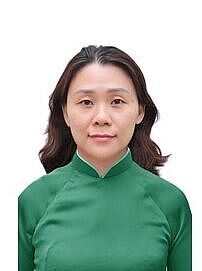MARE BALTICUM LECTURES - Dr. Pham Thanh
Didaktik der Chemie
Seminarreihe im Sommersemester 2024
Die Universität Rostock heißt Frau Dr. Pham Thanh, eine aufstrebende Wissenschaftlerin auf dem Gebiet der Didaktik der Chemie, im Rahmen des Mare Balticum Fellowship Programms willkommen
Die Universität Rostock freut sich, im Rahmen des Mare Balticum Fellowship Programms Frau Dr. Pham Thanh Nga von der Hanoi National University of Education (Vietnam) begrüßen zu dürfen Frau Dr. Pham Thanh ist eine aufstrebende Wissenschaftlerin auf dem Gebiet der Didaktik der Chemie. Bekannt für ihre innovative Arbeit in der Entwicklung von MINT-Projekten, wird sie ihre Expertise in ein spannendes Projekt am Department „Leben-Licht-Materie“ an der Interdisziplinären Fakultät einbringen. Während ihres Aufenthaltes, der vom 1. bis zum 30. Juni 2024 stattfindet, wird sie eng mit dem Fachbereich Chemie zusammenarbeiten, um neue Lehrsequenzen und Experimente im MINT-Bereich (einschließlich Medizin) zu entwickeln. Diese sollen nicht nur in der didaktischen Lehre, sondern auch in der MINT-Werbung und in interdisziplinären Lehrkontexten eingesetzt werden.
Im Rahmen ihres Projekts „Interdisziplinary International German Vietnamese Education Workshop“ wird Dr. Pham Thanh zudem vier Workshops anbieten, zu denen alle Wissenschaftler*innen der Universität Rostock, die in der Lehre von MINT-Fächern (einschl. Medizin) engagiert sind:
- 06.06.2024, 13:15 Uhr: STEM (MINT) Education and Student's Career-oriented Development in Vietnam - Challenges and Opportunities
- 13.06.2024, 13:15 Uhr: Interaktive Lehrmethoden in Deutschland - Darlegung vs. Problemorientierung
- 20.06.2024, 13:15 Uhr: Experimental Approaches to Current Biological, Chemical, Physical and Medical Questions
- 27.06.2024, 13:15 Uhr: Erarbeitung eines interaktiven, interdisziplinären Konzepts für Lehr- und Lernvideos im Bereich Life, Light und Matter / Development of an interactive, interdisciplinary concept for teaching and learning videos in the field of Life, Light and Matter
Das Mare Balticum Fellowship Programm der Universität Rostock fördert den wissenschaftlichen Austausch an der Universität Rostock, indem es internationale Forscher*innen zu einem Gastaufenthalt an die Universität Rostock einlädt. In diesem Jahr werden insgesamt acht Fellows erwartet. Das Programm bietet nicht nur die Möglichkeit, neue wissenschaftliche Methoden und Ansätze zu diskutieren, und fördert explizit den interdisziplinären Austausch und die Weiterentwicklung akademischer Kooperationen.
Weitere Informationen zum Mare Balticum Fellowship Programm, weiteren Fellows und deren Veranstaltung finden Sie auf der Webseite des Mare Balticum Fellowship Programms.

